Cheat Sheets
April 28, 2021
This section contains various reminders to jog your memory if you’re not too fresh on basic Erlang data, types, or syntax.
Data Types
| Name | Description | Dialyzer | Example Syntax |
|---|---|---|---|
| integer | number without decimals | integer(), pos_integer(), non_neg_integer() | 1, 2, 3, -213, 16#01FF, 2#101011 |
| float | number with decimals | float() | 1.0, -1.0, 123.12, 1.0e232 |
| number | either floats or integers | number() | 1.0, 1 |
| atom | literals, constants with their own name for value | atom() | abc, 'abc', some_atom@erlang, 'atom with spaces' |
| boolean | atoms true or false | boolean() | true, false |
| reference | unique opaque value | reference() | make_ref() |
| fun | anonymous function | fun(), fun((ArgType) -> RetType) | <code>fun(X) -> X end, fun F(0) -> []; F(N) -> [1 | F(N-1)] end</code> |
| port | opaque type for a file descriptor | port() | N/A |
| pid | process identifier | pid() | <0.213.0> |
| tuple | group a known set of elements | tuple(), {A, B, C} | {celsius, 42}, {a, b, c}, {ok, {X, Y}} |
| map | a dictionary of terms | map(), #{KType => VType}, #{specific_key := VType} | #{a => b, c => d}, Existing#{key := Updated} |
| nil | an empty list | [] | [] |
| list | recursive structure for a list of terms | list(), [Type] | [a, b, c], <code>[a | [b | [c | []]]]</code>, "a string is a list" |
| binary | a flat byte sequence | binary() | <<1,2,3,4>>, <<"a string can be a binary">>, <<X:Size/type, _Rest/binary>> |
Term ordering: number < atom < reference < fun < port < pid < tuple < map < nil < list < binary
Modules and Syntax
%%% This is a module-level comment
%%% @doc This tag includes officiel EDoc documentation.
%%% It can be useful for people to consule
%%% @end
%%% Generate documentation with rebar3 edoc
%%%%%%%%%%%%%%%%%%%%%%%%%%%%%%%%%%%%%%%%%%
%%% Let's start with Module Attributes %%%
%%%%%%%%%%%%%%%%%%%%%%%%%%%%%%%%%%%%%%%%%%
%% This is an attribute or function-specific comment
%% attributes start with a `-', functions with letters.
%% This file should be saved as `sample.erl'
-module(sample).
%% Functions are described in the form Name/Arity, and must
%% be exported through an `-export([...]).' module attribute
-export([f/0, f/1]).
-export([x/0]). % multiple export attributes can exist
%% You can "import" functions from another module, but
%% for clarity's sake (and because there's no namespaces)
%% nobody really does that
-import(module, [y/0]).
%% .hrl files contain headers, and are imported directly
%% within the module.
%% The following includes a private header file from src/
%% or a public header file from include/ in the current app
-include("some_file.hrl").
%% The following includes a public header file from the
%% include/ file of another application
-include_lib("appname/include/some_file.hrl").
%% specify an interface you implement:
-behaviour(gen_server).
%% Define a record (a tuple that compilers handles in a
%% special way)
-record(struct, {key = default :: term(),
other_key :: undefined | integer()}).
%% Just C-style macros
-define(VALUE, 42). % ?VALUE in this module becomes `42'
-define(SQUARE(X), (X*X)). % function macro
-define(DBG(Call), % a fancy debug macro: ?DBG(2 + 2)
io:format("DBG: ~s (~p): ~p~n",
[??Call, {?MODULE, ?LINE}, Call])).
%% Conditionals
-ifdef(MACRO_NAME). % opposite: -ifndef(MACRO_NAME).
-define(OTHER_MACRO, ok).
-else. % other option: -elif(NAME).
-define(MACRO_NAME, ok).
-endif.
%% Type definitions
-type my_type() :: number() | boolean().
-type my_container(T) :: {[T], [T], my_type(), mod:type()}
-export_type([my_type/0, my_container/1]).
%% you can also define custom attributes:
-my_attribute(hello_there).
-author("Duke Erlington").
%%%%%%%%%%%%%%%%%%%%%%%%%%%%%%%%%%%%%%%%%%%%%%
%%% And now modules for code and functions %%%
%%%%%%%%%%%%%%%%%%%%%%%%%%%%%%%%%%%%%%%%%%%%%%
%% @doc A function with 0 arguments returning an atom
-spec f() -> term(). % optional spec
f() -> ok.
-spec f(number()) -> float().
f(N) -> N + 1.0.
%% Pattern matching with clauses
x([]) -> []; % base recursive clause for a list
x([_H|T] -> [x | T]. % replace list element with `x' atom
%% @private variable binding rules
same_list(X = [_|_], X) -> true;
same_list([], []) -> true;
same_list(_, _) -> false.
%% Operators in the language
operators(X, Y) ->
+X, -Y, % unary
X + Y, X - Y, X * Y, X / Y, % any numbers
X div Y, X rem Y, % integers-only
X band Y, X bor Y, X bxor Y, % binary operators
X bsl Y, X bsr L, % bit shifting
not X, % boolean not
X andalso Y, X orelse Y, % shortcircuit boolean operators
X < Y, X > Y, X >= Y, X =< Y, % comparison
X == Y, X /= Y, % equality (float == int)
X =:= Y, X =/= Y, % strict equality (float =/= int)
X ++ Y, X -- Y, % append Y to X, delete Y from X
X ! Y. % send message Y to process X
%% Using guards. Valid guard expressions at:
%% erlang.org/doc/reference_manual/expressions.html#guard-sequences
comfortable({celsius, X}) when X >= 18, X =< 26 -> % AND clauses
true;
comfortable({celsius, _}) ->
false.
uncomfortable({celsius, X}) when X =< 18; X >= 26 -> % OR clauses
true;
uncomfortable({celsius, _}) ->
false.
%% difference with 'andalso' and 'orelse'
conds(X) when (is_number(X) orelse is_integer(X))
andalso X < 9 ->
%% equivalent (A AND B) OR C
true;
conds(X) when is_number(X); is_integer(X), X < 9 ->
%% - parentheses impossible with , or ;
%% - equivalent to A OR (B AND C)
true;
conds(T) when element(1, T) == celsius; is_integer(T) ->
%% element/2 extracts an element from a tuple. If `T' is
%% not a tuple, the call fails and `is_integer/1' is tried
%% instead
true;
conds(T) when element(1, T) == celsius orelse is_integer(T) ->
%% this can never work: if element/2 fails, the whole
%% `orlese' expressoin fails and `is_integer/1' is skipped
true.
%% Conditionals
conditional('if', Light) ->
if Light == red -> stop;
Light == green; Light == yellow -> go_fast;
true -> burnout % else clause!
end;
conditional('case', {Light, IsLate}) ->
case Light of
green -> go;
yellow when IsLate -> go_fast;
_ -> stop
end;
conditional(pattern, green) -> go;
conditional(pattern, yellow) -> slow;
conditional(pattern, red) -> stop.
%% List and binary comprehensions
comp(ListA, ListB) ->
[X*X || X <- ListA, X rem 2 == 0], % square even numbers
[{X,Y} || X <- ListA, Y <- ListB], % all possible pairs
<< <<X:8>> || X <- ListA >>. % turn list into bytes
comp(BinA, BinB) -> % now with binaries
<< <<X*X:32>> || <<X:8>> <= Bin, X rem 2 == 0 >>,
[{X,Y} || <<X:32>> <= BinA, <<Y:8>> <= BinB],
[X || <<X:8>> <= BinA].
%% Anonymous and higher order functions
higher_order() ->
If = fun(Light) -> conditional('if', Light) end,
Case = fun(Light) -> conditional('case', {Light, true}) end,
lists:map(If, [green, yellow, red]),
lists:map(Case, [green, yellow, red]),
If(red), % can be called literally
lists:map(fun(X) -> X*X end, [1,2,3,4,5]).
try_catch() ->
try
some_call(), % exceptions in this call are caught as well
{ok, val}, % common good return value to pattern match
{error, reason}, % common bad return value to pattern match
% any of these expression aborts the execution flow
throw(reason1), % non-local returns, internal exceptions
error(reason2), % unfixable error
exit(reason3) % the process should terminate
of % this section is optional: exceptions here are not caught
{ok, V} ->
do_something(V),
try_catch(); % safely recurse without blowing stack
{error, R} ->
{error, R} % just return
catch % this section is optional: various patterns
throw:reason1 -> handled;
reason2 -> oops; % never matches, `throw' is implicit type
error:reason2 -> handled;
exit:reason3 -> handled;
throw:_ -> wildcard_throws;
E:R when is_error(E) -> any_error;
_:_:S -> {stacktrace, S}; % extract stacktrace
after -> % this is an optional 'finally' block
finally
end.
Processes and Signals
%% Start a new process
Pid = spawn(fun() -> some_loop(Arg) end)
Pid = spawn('[email protected]', fun() -> some_loop(Arg) end)
Pid = spawn(some_module, some_loop, [Arg])
Pid = spawn('[email protected]', some_module, some_loop, [Arg])
%% Spawn a linked process
Pid = spawn_link(...) % 1-4 arguments as with spawn/1-4
%% Spawn a monitored process atomically
{Pid, Ref} = spawn_monitor(fun() -> some_loop(Arg) end)
{Pid, Ref} = spawn_monitor(some_module, some_loop, [Arg])
%% Spawn with fancy options
spawn_opt(Fun, Opts)
spawn_opt(Node, Fun, Opts)
spawn_opt(Mod, Fun, Args, Opts)
spawn_opt(Node, Mod, Fun, Args, Opts)
%% Options must respect the following spec; many are advanced
[link | monitor |
{priority, low | normal | high | max} | % don't touch
{fullsweep_after, integer() >= 0} | % full GC
{min_heap_size, Words :: integer() >= 0} | % perf tuning
{min_bin_heap_size, Words} |
{max_heap_size, % heap size after which
Words | % the process may be killed. Use
#{size => integer() >= 0, % to indirectly set max queue sizes
kill => boolean(),
error_logger => boolean()}}
%% send an exit signal to a process
exit(Pid, Reason)
%% Receive a message
receive
Pattern1 when OptionalGuard1 ->
Expression1;
Pattern2 when OptionalGuard2 ->
Expression2
after Milliseconds -> % optional
Expression
end
%% Naming processes
true = register(atom_name, Pid)
true = unregister(atom_name)
Pid | undefined = whereis(atom_name)
%% Monitor
Ref = erlang:monitor(process, Pid)
true = erlang:demonitor(Ref)
true | false = erlang:demonitor(Ref, [flush | info])
%% Links
link(Pid)
unlink(Pid)
process_info(trap_exit, true | false)
And the semantics for links and monitors, in diagram forms:

Figure 1: Monitors are unidirectional informational signals, and they stack
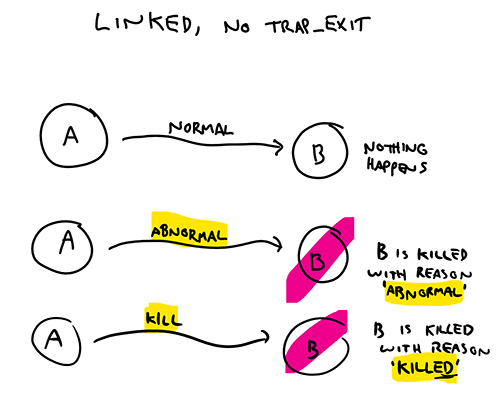
Figure 2: Untrapped links are bidirectional and kill the other process, except if the reason is ’normal'
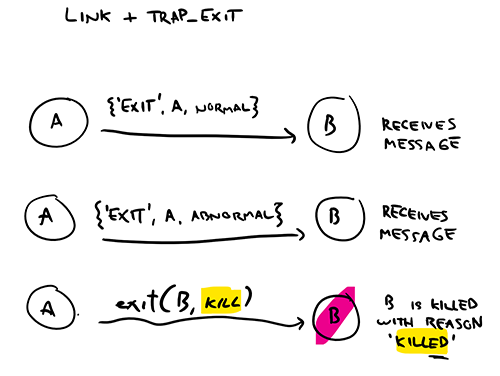
Figure 3: Trapped links are converted to messages, except for the untrappable ‘kill’ reason
OTP processes do have slightly different semantics due to supervision shenanigans:
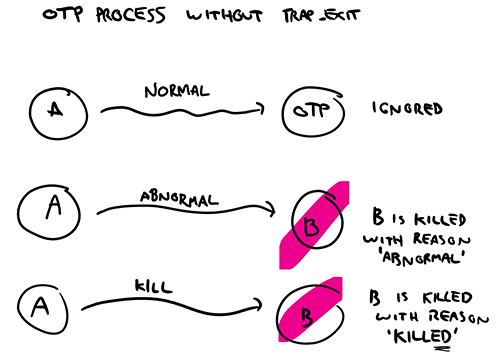
Figure 4: Untrapped links work the same for OTP
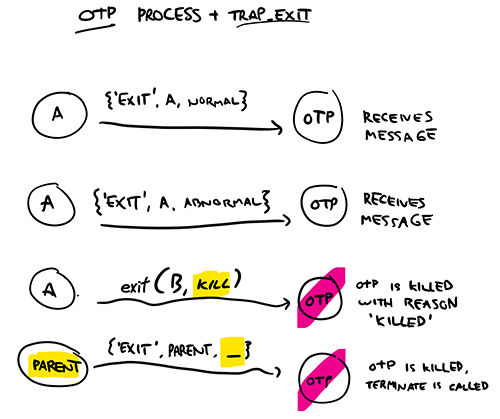
Figure 5: Trapped links behave in a special way when the parent of a process is the one that dies
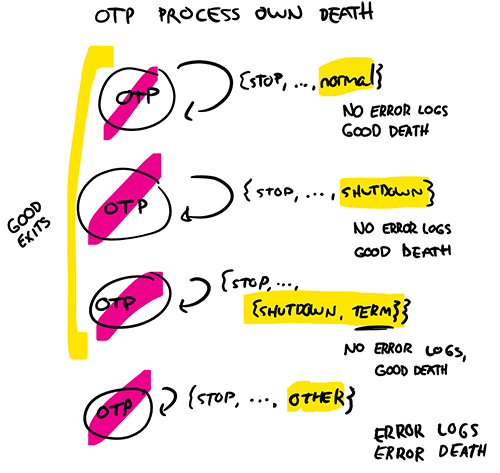
Figure 6: Supervisors log things differently based on the termination reason
Behaviours
Not all OTP behaviours are listed here, only thee most frequently-used ones.
Applications
| Trigger | Called By | Handled By | Return | Description |
|---|---|---|---|---|
application:start/1-2 | client or booting VM | start(Type, Args) | <code>{ok, pid()} | {ok, pid(), State}</code> | should start the root supervisor |
{start_phases, [{Phase, Args}]} in app file | kernel booting the app | start_phase(Phase, Type, Args) | <code>ok | {error, Reason}</code> | Optional. Can isolate specific steps of initialization |
application:stop/1 | app shutting down | prop_stop(State) | State | Optional. Called before the supervision tree is shut down |
application:stop/1 | app shutting down | stop(State) | term() | called once the app is done running to clean things up |
| Hot code update | SASL’s release handler | config_change(Changed::[{K,V}], New::[{K,V}], Removed::[K]) | ok | Called after a hot code update using the VM’s relup functionality, if the configuration values changed |
Supervisors
| Trigger | Called By | Handled By | Return | Description |
|---|---|---|---|---|
supervisor:start_link/2-3 | parent process | init(Arg) | <code>ignore | {ok, {SupFlag, [Child]}}</code> | Specifies a supervisor. Refer to official documentation |
gen_server
| Trigger | Called By | Handled By | Return | Description |
|---|---|---|---|---|
gen_server:start_link/3-4 | supervisor | init(Arg) | <code>{ok, State [, Option]} | ignore | {stop, Reason}</code> | Set up the initial state of the process |
gen_server:call/2-3 | client | handle_call(Msg, From, State) | <code>{Type::reply | noreply, State [, Option]} | {stop, Reason [, Reply], State}code> | Request/response pattern. A message is received and expects an answer |
gen_server:cast/2 | client | handle_cast(Msg, State) | <code>{noreply, State [, Option]} | {stop, Reason, State}</code> | Information sent to the process; fire and forget |
Pid ! Msg | client | handle_info(Msg, State) | same as handle_cast/2 | Out-of-band messages, including monitor signals and 'EXIT' messages when trappig exit |
Setting an Option value to {continue, Val} | the server itself | handle_continue(Val, State) | same as handle_cast/2 | Used to break longer operations into triggerable internal events |
gen_server:stop/1,3 | client or supervisor | terminate(Reason, State) | term() | Called when the process is shutting down willingly or through errors. If the process does not trap exits, this callback may be omitted |
sys:get_status/2-3, crash logs | client, the server itself | <code>format_status(normal | terminate, [PDict, State])</code> | [{data, [{"State", Term}]}] | Used to add or remove information that would make it to debugging calls or error logs |
| N/A | supervisor | code_change(OldVsn, State, Extra) | {ok, NewState} | called to update a stateful process if the proper instructions are given during a hot code upgrade with releases |
gen_statem
Process management
| Trigger | Called By | Handled By | Return | Description |
|---|---|---|---|---|
gen_statem:start_link/3-4 | supervisor | init(Arg) | <code>{ok, State, Data [, Actions]} | ignore | {stop, Reason}</code> | Sets the initial state and data for the state machine |
| N/A | internal | callback_mode() | <code>[state_functions | handle_event_function [, state_enter]]</code> | Defines the type of FSM and whether entering a state triggers a special internal event |
gen_statem:stop/1,3 | client or supervisor | terminate(Reason, State, Data) | term() | Called when the process is shutting down willingly or through errors. If the process does not trap exits, this callback may be omitted |
sys:get_status/2-3, crash logs | client, the server itself | <code>format_status(normal | terminate, [PDict, State, Data])</code> | [{data, [{"State", Term}]}] | Used to add or remove information that would make it to debugging calls or error logs |
| N/A | supervisor | code_change(OldVsn, State, Data, Extra) | {ok, NewState, NewData} | called to update a stateful process if the proper instructions are given during a hot code upgrade with releases |
State handling and transitions
Handled by either handle_event/4 or StateName/3 functions, based on the value of callback_mode(). The function signatures are either:
handle_event(EventType, EventDetails, State, Data)State(EventType, EventDetails, Data)
If the value of State is not a list, even though callback_mode() defined state_functions, then handle_event/4 will be called. All possible return values for either functions are one of:
{next_state, State, Data}{next_state, State, Data, [Actions, ...]}{stop, Reason, Data}{stop, Reason, Data, [Actions, ...]}
Various short forms exist, such as keep_state_and_data, {keep_state, Data}, {repeat_state, Data}, and many more. Refer to the documentation for their content.
The Actions value is any combination of the following list (non-inclusive): postpone, {next_event, EventType, EventDetails}, hibernate, {timeout, Delay, EventDetails}, {state_timeout, Delay, EventDetails}, {reply, From, Reply}, hibernate. Consult the documentation for more options.
| Trigger | Called By | Event Type | Event Details | Description |
|---|---|---|---|---|
gen_statem:call/2-3 | client | {call, From} | term() | Request/response pattern. A message is received and is expected to receive an answer |
gen_statem:cast/2 | client | cast | term() | Information must be sent to the process; fire and forget |
| Pid ! Msg | client | info | Msg | Out-of-band messages, including monitor messages and 'EXIT' signals that are trapped |
{timeout, T, Msg} | Action return value | timeout | Msg | A specific timeout that can be set and received internally when the state machine has not received a new event in T milliseconds |
{state_timeout, T, Msg} | Action return value | state_timeout | Msg | A specific timeout that can be set and received internally when the state machine has not transitioned to a new different state in T milliseconds |
{next_event, internal, Msg} | Action return value | internal | Msg | Internal messages that can be generated by a state machine wanting to trigger itself without looking like external calls |